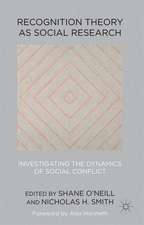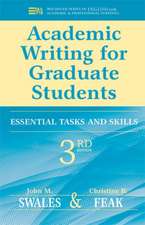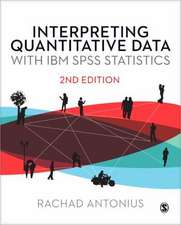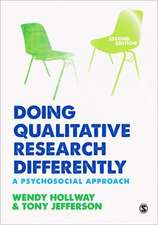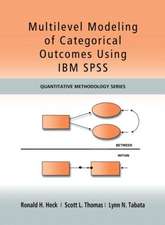Handling Missing Data in Ranked Set Sampling: SpringerBriefs in Statistics
Autor Carlos N. Bouza-Herreraen Limba Engleză Paperback – 15 oct 2013
Din seria SpringerBriefs in Statistics
-
 Preț: 378.34 lei
Preț: 378.34 lei - 15%
 Preț: 459.93 lei
Preț: 459.93 lei - 17%
 Preț: 359.75 lei
Preț: 359.75 lei -
 Preț: 411.54 lei
Preț: 411.54 lei -
 Preț: 445.88 lei
Preț: 445.88 lei -
 Preț: 445.33 lei
Preț: 445.33 lei -
 Preț: 378.71 lei
Preț: 378.71 lei -
 Preț: 375.23 lei
Preț: 375.23 lei -
 Preț: 378.71 lei
Preț: 378.71 lei -
 Preț: 350.50 lei
Preț: 350.50 lei -
 Preț: 378.54 lei
Preț: 378.54 lei -
 Preț: 378.71 lei
Preț: 378.71 lei - 15%
 Preț: 461.73 lei
Preț: 461.73 lei -
 Preț: 352.28 lei
Preț: 352.28 lei -
 Preț: 378.54 lei
Preț: 378.54 lei -
 Preț: 377.73 lei
Preț: 377.73 lei - 5%
 Preț: 360.70 lei
Preț: 360.70 lei -
 Preț: 351.42 lei
Preț: 351.42 lei -
 Preț: 378.92 lei
Preț: 378.92 lei -
 Preț: 375.07 lei
Preț: 375.07 lei -
 Preț: 342.74 lei
Preț: 342.74 lei -
 Preț: 444.35 lei
Preț: 444.35 lei -
 Preț: 414.42 lei
Preț: 414.42 lei - 15%
 Preț: 462.70 lei
Preț: 462.70 lei -
 Preț: 378.54 lei
Preț: 378.54 lei -
 Preț: 378.12 lei
Preț: 378.12 lei -
 Preț: 271.46 lei
Preț: 271.46 lei -
 Preț: 347.71 lei
Preț: 347.71 lei -
 Preț: 377.73 lei
Preț: 377.73 lei -
 Preț: 270.74 lei
Preț: 270.74 lei -
 Preț: 378.54 lei
Preț: 378.54 lei - 5%
 Preț: 327.04 lei
Preț: 327.04 lei -
 Preț: 377.18 lei
Preț: 377.18 lei -
 Preț: 273.40 lei
Preț: 273.40 lei -
 Preț: 377.18 lei
Preț: 377.18 lei -
 Preț: 379.30 lei
Preț: 379.30 lei -
 Preț: 376.59 lei
Preț: 376.59 lei -
 Preț: 379.68 lei
Preț: 379.68 lei -
 Preț: 272.04 lei
Preț: 272.04 lei -
 Preț: 379.09 lei
Preț: 379.09 lei -
 Preț: 446.26 lei
Preț: 446.26 lei -
 Preț: 375.84 lei
Preț: 375.84 lei -
 Preț: 344.14 lei
Preț: 344.14 lei -
 Preț: 348.72 lei
Preț: 348.72 lei -
 Preț: 377.95 lei
Preț: 377.95 lei -
 Preț: 269.71 lei
Preț: 269.71 lei - 5%
 Preț: 361.06 lei
Preț: 361.06 lei -
 Preț: 375.84 lei
Preț: 375.84 lei -
 Preț: 442.62 lei
Preț: 442.62 lei
Preț: 378.54 lei
Nou
Puncte Express: 568
Preț estimativ în valută:
72.45€ • 75.34$ • 60.63£
72.45€ • 75.34$ • 60.63£
Carte tipărită la comandă
Livrare economică 15-29 martie
Preluare comenzi: 021 569.72.76
Specificații
ISBN-13: 9783642398988
ISBN-10: 3642398987
Pagini: 128
Ilustrații: X, 116 p.
Dimensiuni: 155 x 235 x 7 mm
Greutate: 0.19 kg
Ediția:2013
Editura: Springer Berlin, Heidelberg
Colecția Springer
Seria SpringerBriefs in Statistics
Locul publicării:Berlin, Heidelberg, Germany
ISBN-10: 3642398987
Pagini: 128
Ilustrații: X, 116 p.
Dimensiuni: 155 x 235 x 7 mm
Greutate: 0.19 kg
Ediția:2013
Editura: Springer Berlin, Heidelberg
Colecția Springer
Seria SpringerBriefs in Statistics
Locul publicării:Berlin, Heidelberg, Germany
Public țintă
GraduateCuprins
Preface.- Missing Observations and Data Quality Improvement.- Sampling Using Ranked Sets: Basic Concepts.- The Non Response Problem: Sub-sampling among the Non Respondents.- Imputation of the Missing Data.- Some Numerical Studies of the Behavior of RSS.
Recenzii
From the reviews:
“This monograph treats missing data due to non-inclusion of units in the sampling frame (non-coverage) or to individual non-responses in theoretical ‘ranked set sampling’ framework. … The author’s effort in producing a book that attempts to go beyond the realms of the standard is appreciated and applauded. The book, in its current form, contains some issues of interest to survey sampling practitioners.” (Mariano Ruiz Espejo, International Statistical Review, Vol. 82 (1), 2014)
“This monograph treats missing data due to non-inclusion of units in the sampling frame (non-coverage) or to individual non-responses in theoretical ‘ranked set sampling’ framework. … The author’s effort in producing a book that attempts to go beyond the realms of the standard is appreciated and applauded. The book, in its current form, contains some issues of interest to survey sampling practitioners.” (Mariano Ruiz Espejo, International Statistical Review, Vol. 82 (1), 2014)
Notă biografică
Carlos N. Bouza-Herrera was born in La Habana, Cuba on 29/x/1942. He obtained his BSc. and MSc. in mathematical statistics at the School of Mathematics of Universidad de La Habana and his PhD at the University of Belgrade, former Yugoslavia, in 1977. Since 1971 he has been teaching at the Universidad de La Habana and is currently a consultant professor (emeritus). His research interests are sampling theory, non parametric inference, robust statistics and stochastic optimization. He has also taught undergraduate and graduate courses in Colombia, France, Mexico, Spain and Venezuela. He has been invited to develop joint research by institutions in Brazil, Colombia, China, Cuba, France, India, Italy, Mexico and Spain. He is the author of more than 150 papers and 12 books and monographs published by editorials in Asia, Europe, Latin America and the United States. He is currently working as a referee for different well-known journals and is a contributing editor of Current Index to Statistics and International Abstracts of Operations Research. His wife, Sira, and daughter, Gemayqzel, also have a PhD in Mathematics. He loves jazz and plays the saxophone and pan flute. His favorite sport is jogging.
Textul de pe ultima copertă
The existence of missing observations is a very important aspect to be considered in the application of survey sampling, for example. In human populations they may be caused by a refusal of some interviewees to give the true value for the variable of interest. Traditionally, simple random sampling is used to select samples. Most statistical models are supported by the use of samples selected by means of this design. In recent decades, an alternative design has started being used, which, in many cases, shows an improvement in terms of accuracy compared with traditional sampling. It is called Ranked Set Sampling (RSS). A random selection is made with the replacement of samples, which are ordered (ranked). The literature on the subject is increasing due to the potentialities of RSS for deriving more effective alternatives to well-established statistical models. In this work, the use of RSS sub-sampling for obtaining information among the non respondents and different imputation procedures are considered. RSS models are developed as counterparts of well-known simple random sampling (SRS) models. SRS and RSS models for estimating the population using missing data are presented and compared both theoretically and using numerical experiments.
Caracteristici
Fills the gap in the literature on missing observations for ranked set sampling models Provides ready-to-use models for dealing with non responses in surveys Prepares the reader to develop further research on estimation with missing observations? Includes supplementary material: sn.pub/extras


